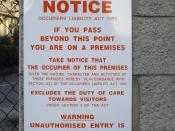In the case of Crocker vs. The Kamakazi Ski Lodge Limited, Crocker, the plaintiff, is looking to place the Kamakazi Ski Lodge as liable for his injuries that occurred during a race there. The aspect in which Crocker would most likely try to plea his case would be through the negligence of the lodge and it's employees.
Three elements must exist for the case to be deemed negligent: 1. The defendant must have owed the plaintiff a duty of care, 2. The defendant must have breached that duty of care through his actions, and 3. The defendant's actions caused the injury. The lodge was taken out of any duty of care because of the waivers that the plaintiff had signed. During the time he signed he was aware of his actions. Therefore he must move to negligence of the employees.
Crocker will probably try to go after the employee that gave him the tube and the race operator.
The employee that gave him the tube will not get charged due to the fact that he does not run the competition and has the job of only giving the tubes to competitors. He has no control over the race or it's competitors, although he could suggest to the race operator the he is unfit yet he cannot take the customer out of the race.
The race operator will be the one charged and held liable. This will be because even though the employees are covered in the waiver, a duty of care was still owed to the defendant by the race operator. This is because he had the ability to allow the plaintiff to race or not. He should have recognized that the plaintiff was unable to race since he saw him take a drink, and he should know that he would not be making the right decision in racing.
Therefore the Race Operator will be held liable due to negligence because he fits the three elements. He owed the plaintiff a duty of care, he breached that duty by allowing him to race, and in allowing him to race his actions caused the plaintiff to receive injuries.





